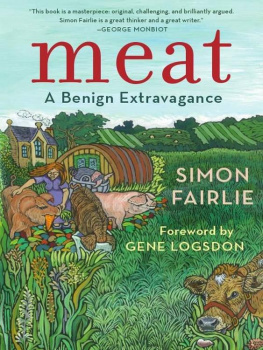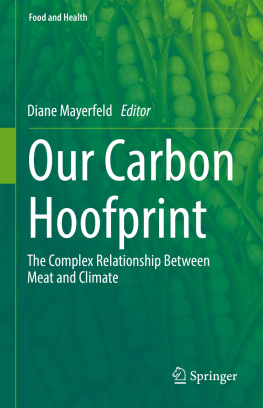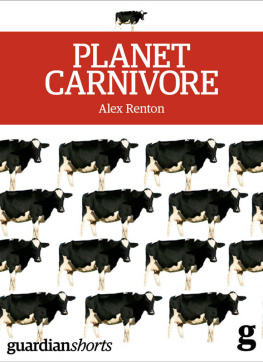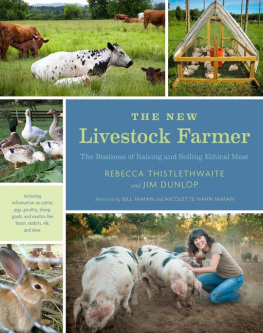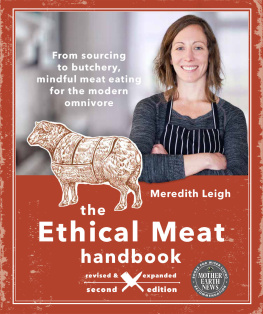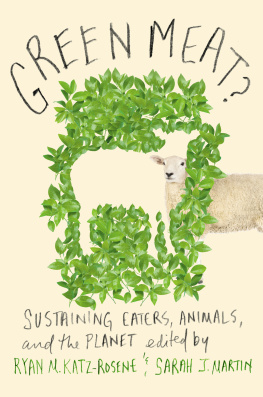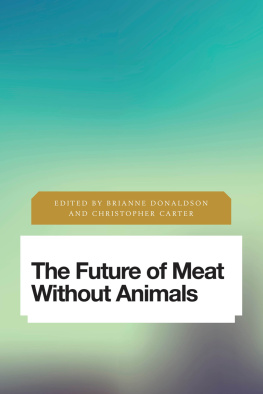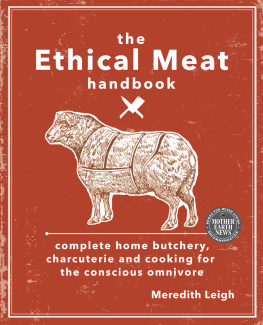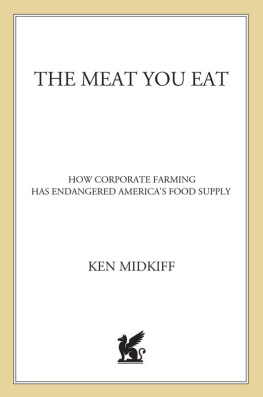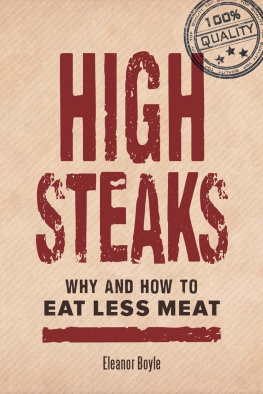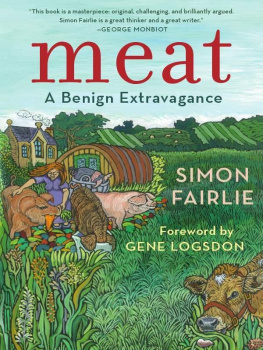
Simon Fairlie provides us with an unusual and extremely important gift in his new book, Meat: A Benign Extravagance . Everyone interested in how their food choices can affect the ecological, social, and economic health of the communities in which they live should read this book.
Frederick Kirschenmann, Distinguished Fellow,
Leopold Center for Sustainable Agriculture, and
President of Stone Barns Center for Food and Agriculture
This is a tremendous and very timely book: the worlds meat consumption is rapidly rising, leading to devastating environmental impacts as well as having long-term health implications for societies everywhere. Simon Fairlies book lays out the reasons why we must decrease the amount of meat we eat, both for the planet and for ourselves. This brilliant book is essential reading for anyone who cares about food and the environment.
Rosie Boycott, Founder of Spare Rib and Virago Press,
ex-editor of the Independent , Independent on Sunday, Daily Express
and Esquire magazine, broadcaster, writer and campaigner and
currently Food Advisor to the Mayor of London
Meat, animals and dairy have been in the firing line for so long that in some circles, the assumption is taken for granted that there is no case, ever, anywhere, to be made for the role of animals in farming, landcare or diet. This book by Simon Fairlie is a wonderful and challenging correction. As a former Welsh Black breeder who farmed upland wet English hills but who gave up meat years ago (but takes dairy produce), I found this book a riveting read. As an academic who grapples with what land is for and what a sustainable diet might be, I assure you that this book is essential reading. Fairlies beautifully written, practical yet erudite book covers the terrain that policy-makers now realise needs to be addressed. Fairlie makes the case for not throwing the baby out with the bath water, or should that be dont demonise the animal before you know its function and value?
Tim Lang, Professor of Food Policy, City University London
No one has ever analysed the worlds food and agriculture more astutely than Simon Fairlie an original thinker and a true scholar. Here he shows that while meat is generally a luxury it is often the best option, and could always be turned to advantage if only we did things properly; but this, with present economic policies and legal restrictions, is becoming less and less possible. Everyone should read this book especially governments, and all campaigners.
Colin Tudge, Biologist and author
Some hae meat and canna eat,
And some wad eat that want it;
But we hae meat, and we can eat,
Sae let the Lord be thankit.
The Selkirk Grace
MEAT
A Benign Extravagance
Simon Fairlie
Chelsea Green Publishing
White River Junction, Vermont
Copyright 2010 by Simon Fairlie
All rights reserved.
No part of this book may be transmitted or reproduced in any form by any means without permission in writing from the publisher.
Meat: A Benign Extravagance was originally published in 2010 in the United Kingdom by Permanent Publications, The Sustainability Centre, East Meon, Hampshire GU32 1HR, UK.
www.permaculture.co.uk
Printed in the United States of America
First Chelsea Green printing December, 2010
Our Commitment to Green Publishing
Chelsea Green sees publishing as a tool for cultural change and ecological stewardship. We strive to align our book manufacturing practices with our editorial mission and to reduce the impact of our business enterprise in the environment. We print our books and catalogs on chlorine-free recycled paper, using vegetable-based inks whenever possible. This book may cost slightly more because we use recycled paper, and we hope youll agree that its worth it. Chelsea Green is a member of the Green Press Initiative (www.greenpressinitiative.org), a nonprofit coalition of publishers, manufacturers, and authors working to protect the worlds endangered forests and conserve natural resources.
eBook ISBN: 978-1-60358-325-1
Library of Congress Cataloging-in-Publication Data on file with the publisher
Chelsea Green Publishing Company
Post Office Box 428
White River Junction, VT 05001
(802) 295-6300
www.chelseagreen.com
CONTENTS
An abbreviated history of livestock and civilization.
How efficient is meat and dairy production? Is it too extravagant in its use of land?
Between full-blooded carnivorism and outright veganism, there is an intermediate level of sustainable meat-eating which can be reasonably clearly defined.
How and why the UK has turned champion recyclers into grain guzzlers.
The unholy alliance between the meat and the vegetable oil industries.
How to fit a quart of water into into a pint-sized cow.
The politics of nitrogen and the prospects for organic agriculture.
Seven different strategies for feeding Britain are compared.
Causes of famine, and why meat-eating can help to forestall it.
How default livestock feeds landless people.
Muscle power, biomass and local food.
Is meat-eating worse for the climate than driving a car?
Can grass farming replenish the environment and offset carbon emissions?
Where might vegan concepts of wilderness and nature lead us?
On achieving a balance between trees and grass.
What would the British countryside look like with more trees, default livestock and no fossil fuels?
S imon Fairlies Meat: The Benign Extravagance is the sanest book I have read on the subject of how the human race is going to feed itself in the years ahead. Its main attention is given to the pro-meat versus no-meat debate, but it really involves an intense scrutiny of what we know and dont know about the entire food chain. Fairlies search to ferret out the truth in these matters is awesomely thoroughhe leaves no stone unturned.
I have been tempted to try writing a book like this one, waving a flag of caution before all the fervent advocates of one diet or another. But I doubt that I could endure the displeasure, even wrath, that would be visited upon me if I pointed out, as Fairlie does, that neither vegan nor meat glutton, nor factory farmer nor, horrors, even my own favorite food-production systempasture farminghas all the answers. Fairlie is made of sterner stuff.
Somebody had to write this book, and thank heavens it was a writer with the wit and wisdom of Simon Fairlie. The reason his book is so important is that what it addressesfood security, first and foremostis being undermined by well-intentioned people of all persuasions who are demanding rules and regulations in food matters without enough knowledge. We all have very firm convictions about what we want to eat and dont want to eat, but the only direct contact with the food chain that most of us experience is what we see when we sit down at the table. We have only foggy notions of how all forms of life interact in the food chain, how we are all seated at an unimaginably vast table, eating and being eaten. In fact, even scientists who make these matters their lifelong study know only a little, and the honest ones readily admit it.
But because we have zillions of reams of information about food production and endless columns of numbers to pick from in support or denial of whatever we want to believe, we think that human intelligence has analyzed the subject well enough to start dictating public policy about what we should eat and how it should be produced. This book is most valuable because it will convince the open-minded reader that when we start making grand statements about the earths food-carrying capacity, more than a little humility is in order. No matter how fervently we support the no-meat or the pro-meat point of view, or how much allegiance we have for any particular dietary bible, or what kind of farming we think best serves humanitys food purposes, or what we think about carbon footprints, global warming, greenhouse gases and any of the other trendy phrases with which the news batters us, or what economic religion we think best serves the purpose of providing food for all, I challenge anyone to read this book and not realize that no one has all the right answers, because neither science nor ideology knows all the right answers yet.
Next page
